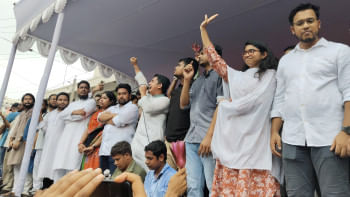Education gets a big boost
The government broke with its tradition in education by boosting the allocation 32 percent year-on-year to Tk 49,009 crore for the next fiscal year.
The amount is 2.4 percent of the GDP (gross domestic product) and 14.38 percent of the total outlay.
The allocation to the sector was Tk 37,106 crore in the revised budget of the outgoing fiscal year. Since 2011, the year-on-year rise in the allocation has been around 10 to 11 percent, except fiscal 2013-14 when the jump was 17 percent.
This year's budget proposal sets aside Tk 26,847 crore for the education ministry and Tk 22,162 crore for the primary and mass education ministry.
Experts and educationists of the country have long been advocating for increasing the government expenditure on education.
They say the ratio of the education budget to the GDP has remained around two percent for several years, which is lower than many other Asian countries like Vietnam and Nepal.
The proposal for the next fiscal year has made them hopeful. They praised the government but at the same time insisted on proper utilisation of the money.
"We have to keep this trend up so that we move towards the international practice of allocating four to six percent of the GDP and 20 percent of the total budget [for education] within the next three years," said Prof Manzoor Ahmed, professor emeritus of Brac University, by phone.
The government should pay attention to ensure that the money is used properly, said Prof Manzoor.
The finance minister has come up with some new plans for the sector.
"We have a plan to recruit another 3,000 teachers and provide them with training.”
The authorities have been working to implement the plan for extending primary education up to class-VIII by 2018, Muhith said. Grade-VI and grade-VII have already been included at 760 primary schools.
In order to ensure quality primary education, the government will continue with the existing programmes, including free distribution of books and learning materials, appointment of teachers and their training, and construction and reconstruction of primary schools and training institutes.
A "National School Feeding Policy" is being formulated with a view to widening the coverage of the school feeding programme and engaging private sector in this initiative.
The budget also proposes an allocation of Tk 200 crore for renovation of dilapidated schools. A policy, to this end, will be finalised within two months, Muhith announced.
He also suggested allocating Tk 500 crore as endowment fund and Tk 100 crore as one-time grant to “Non-Government Education Institute Retirement Benefit Board” for the welfare of non-government teachers.
In addition, the finance minister proposed allocating Tk 50 crore for “Non-Government Teachers and Employees Welfare Trust”.
Muhith urged the private sector to come forward to help construct 63,000 classrooms since the government's capacity is limited.
Due to lack of proper maintenance, many buildings of educational institutions of primary to higher education are in a poor condition, he added.

 For all latest news, follow The Daily Star's Google News channel.
For all latest news, follow The Daily Star's Google News channel. 








Comments